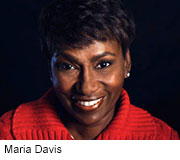
FRIDAY, Nov. 30 (HealthDay News) — It was 1995, and 36-year-old Maria Davis had it all: a successful career as a music promoter and a model, two kids, and a man she loved so much she was going to move thousands of miles to be with him.
Then she took a blood test, and everything changed.
The test was for a life insurance policy. She was young and healthy, but she wanted to make sure her children would be taken care of if something happened to her. She didn’t think twice about giving a blood sample to get the insurance.
Ten days later, she received a green card from the post office telling her that there was a certified letter waiting for her.
“I’ll never forget that moment when I opened up that letter,” Davis said. “It said, ‘We’re sorry to inform you that you have the HIV antibodies.’ My first thought was that my life was over. I thought I wouldn’t get to see my children graduate. There wasn’t a lot of information out there at the time.”
She heard through a close friend that the man she loved in Jamaica was ill, which confirmed what she had suspected — that she had contracted HIV through him.
After having the HIV test confirmed, Davis went into a long period of denial. “I wasn’t gay and I wasn’t a white man — that’s who had AIDS then,” she recalled. “I didn’t take any medications for a long time.”
By December of 1998, Davis was very sick. She was down to 95 pounds and had a hole in her tongue from a yeast infection. She ended up in the hospital for almost two months.
“I had crossed over the line from HIV to AIDS,” she said. “Someone at [a support group] told me if you don’t get on a medication regimen, you won’t live to see your children grow up.”
That was the message she needed to hear. Davis and her doctors did not have an easy go of it, dealing with her complications and getting the virus back under control, but she said her viral load has been undetectable since 2007.
“I just started building myself up physically and spiritually, and growing in who I was,” Davis said. “What I was before, I’m not now. Does that mean I’m a failure? No. I just have to do things differently. I can still run, but I run slower now.” She’s run in three New York City Marathons.
She also got to see her children graduate.
Davis has turned her experience into something positive. She’s shared her story as an ambassador for the “Making AIDS History” project of amfAR (the American Foundation for AIDS Research) for about two years, and she’s also a peer educator, saying she’ll talk to anyone who’ll listen about HIV. Davis is also still active in the music industry and offers HIV testing at the various showcases for new talent that she presents about once a month.
She said that people sometimes tell her they don’t need to know about HIV because they don’t have the disease. But, as she said, it’s hard to prevent something you don’t know anything about.
“HIV is a preventable disease, and you don’t have to get HIV to learn about HIV,” explained Davis. “HIV is an everybody thing. We should all be informing each other.”
For anyone who’s just been diagnosed, Davis offered some advice. “You can live,” she said. “Enjoy your life. The challenges? There may be some, but you can live your life and be happy, or you can worry all the time and be negative. It doesn’t have to be the center of your life.”
Davis should know: She’s been living with HIV for 17 years.
More information
A companion article details the effect of HIV on the black community in the United States.

